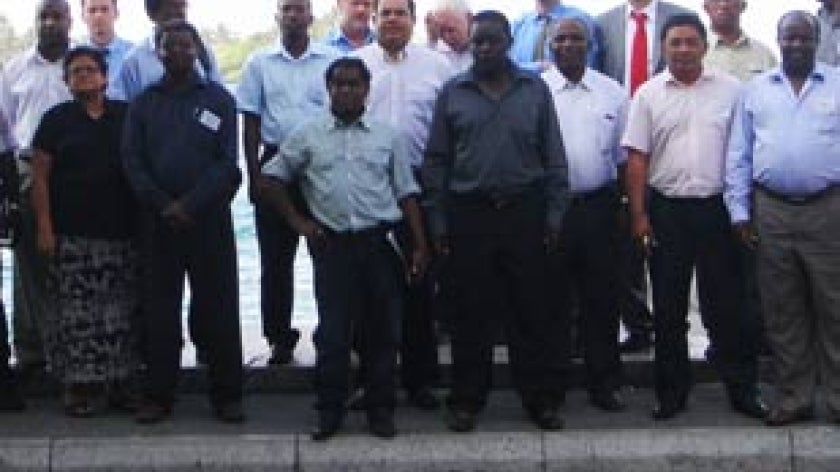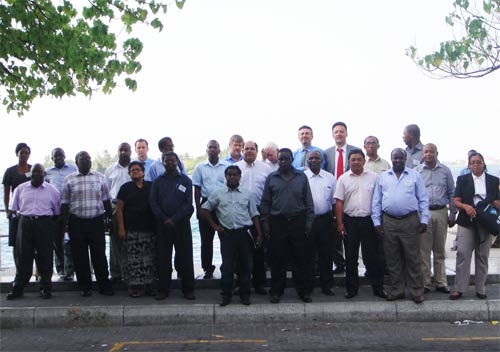
Male, Maldives, March 13-16, 2011
The Fifth Session of the South West Indian Fisheries Commission (SWIOF) was organized upon invitation of the government of Maldives from the 13 to the 16 of March 2011 in the the Nasandhura Hotel in Male, Maldives. The session was opened and facilitated by the HE Dr. Hussein Rasheed Hassan, Minister of Fisheries who took part in every session and showed a strong commitment on this key issue for all coastal and island countries of the region.
The session was attended by delegates from Comoros, Kenya, Madagascar, the Maldives, Mauritius, Mozambique, Seychelles, South Africa and the United Republic of Tanzania. Representatives of the Agulhas Somali Current Large Marine Ecosystem (ASCLME) project, the Global Environment Facility (GEF), the Swedish Board of Fisheries, the South West Indian Ocean Fisheries Project (SWIOF-P), and the World Bank also attended the session as observers.

The Commission noted the work since the fourth session, and addressed a dense agenda:
- it considered the report of the Scientific Committee,
- reflected on the status of fisheries resources and decided to draw attention to depleted stocks,
- discussed the relevant outcomes of the Committee for Fisheries (COFI) and the Regional Fisheries Bodies meeting,
- examined the process of a performance review of the Commission,
- reflected on the extent of implementation of the Ecosystem Approach to Fisheries, examined a project proposal for regional support to strengthen governance and sustainably manage fisheries to alleviate poverty, and
- approved a work programme for the Commission.
- elected Mauritius (chair), Tanzania and Maldives (vice-chairs) to steer the Commission intersessionally and at the sixth session in Mauritius, early 2012.
Background
The SWIOF is a Consultative Regional Fisheries Body (RFB) promoting the sustainable utilization of the living marine resources of the South West Indian Ocean region. The SFWIOF-C also ensures a role of policy decision making body for a GEF International Waters project developed by the World Bank: The South West Indian Ocean Fisheries Project, or SWIOF-P. The SWIOF-P involves nine countries on a very large area: Comoros, Kenya, Madagascar, Mauritius, Mozambique, Seychelles, the United Republic of Tanzania, South Africa, and France (by virtue of its islands in the region although it is not a beneficiary of the grant agreement).
The SWIOF-P aims to promote the environmentally sustainable use of fish resources through adoption by South West Indian Ocean riparian countries of a Large Marine Ecosystem-based ecosystem approach to fisheries management in the Agulhas current and in the South of the Somali current. The SWIOF-P benefits from co-financing from France (FFEM, IRD, IFREMER), Norway (EAF Nansen Program), and FAO (supporting the SWIOF-C).
There are three main different GEF International Waters projects under the Large Marine Ecosystem approach, each addressing a different aspect of coastal and marine issues. Two other demonstration projects have been developed at country level for Tanzania and Kenya.
A UNEP/GEF project was addressing Land Based activities and pollutions (PMIS# 1247, GEF $4,186,140; cofinancing $6,902,325). This project, the WIO-LAB, was closed in mid-2010.
A third project has been developed by UNDP to develop a Transboundary Diagnosis Analysis -TDA- and a Strategic Action Programme –SAP- (PMIS# 1462, GEF $12,2million, cofinancing $18,470,000). The UNDP project aims to address significant coastal and offshore data gaps (artisanal fisheries, larval transport and nursery areas along the coast), and is expected to use the outputs from the UNEP on land based pollutions and those on off-shore fisheries from the WB project to deliver a comprehensive TDA and SAP for the Agulhas Current LME and the southern part of the Somali Current LME (Kenya and Tanzania). The ASCLME ensures a role of Programme coordination.
To be complete, another project was developed for Tanzania as a demonstration project of integrated activities between International Waters and Biodiversity Focal area ($5 million from each focal area). This project entitled the MACEMP (for Marine and Coastal Environment Management Project) was quite successful (we proposed this project for the US Treasury’s visit in fall 2010), and the government of Tanzania is in discussion with the WB to scale up results in other states. Loans of around $100 million are mentioned in discussions. Last, but not least, the GEF approved a $5 million IW project for Kenya in May 2010. This project has not yet started.